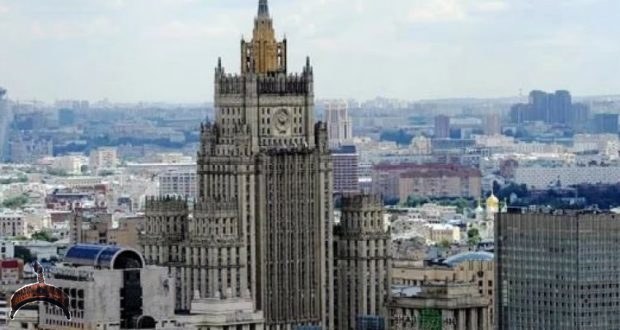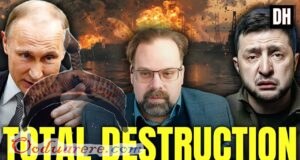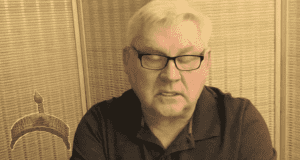“It is strange that Washington forgets the fact that in the run-up to the 1996 Russian presidential election, the Federal Reserve Bank delivered $500 million in cash to the US Embassy in Moscow under a far-fetched pretext of avoiding frenzied demand during the exchange of old $100 notes. Operatives from the CIA’s Moscow Embassy station, headed by Michael Sulick, virtually slept on the money bags, while guarding them. Foreign-made cars delivered small batches of money from the Embassy to certain individuals. Who did the US sponsor using this money? I believe we will also learn this someday.
Here are only a few examples of diverse US activities aiming to undermine stability in various regions worldwide and in those areas that are not ready to follow American instructions. We are in no way demanding that Mr Pompeo should stop his rhetoric because this is in the realm of fiction. One should simply understand that every action has a reaction. We are ready.”
The anti-Russia statements by CIA Director Mike Pompeo
Факт, о котором в США предпочитают не вспоминать… pic.twitter.com/SAOMkMmExT
— Актуальная Политика (@Current_policy) August 18, 2017
We could not but take note of and comment on the June 24 statement by CIA Director Mike Pompeo during his NBC interview. The statement dealt with Russia’s alleged longtime attempts to undermine the American democracy and meddling in US elections. It appears that in his opinion, Russia’s longtime attempts to undermine US democracy have culminated in the interference in US elections.
As we know, the issue of Russia’s meddling in the election process has become a favourite media story and an obsession in the United States. This story has been adopted by anti-Russia propagandists. This issue continues to pick up momentum and is mentioned in statements by officials who are trying to accuse Russia of engaging in unlawful actions but who have failed to produce any evidence to date. We would like to remind them about some outstanding pages of US history. Unlike the Americans, we have real facts at our disposal, and we know what we should focus on.
It is common knowledge that since the early 1990s the United States had voiced its intentions to establish a Jeffersonian democracy in Russia. But the very fact of setting such a task completely runs counter to the ideas of Thomas Jefferson, one of the founding fathers of the American nation and democracy. All of us know that he called for respecting various forms of government, chosen by other nations, and said the United States would not impose its will anywhere. He was mistaken. Thomas Jefferson referred to the idea of dictating the form of government to an independent country as arrogant, brutal and outrageous. It appears that the ideologists of the present-day America have very poor knowledge of their own history and the foundations of their statehood, if the concepts of “exporting democracy” and “humanitarian intervention” have become their favourite method for conducting an aggressive foreign policy and part of their national concept. For decades, dozens of countries all over the world have been suffering from US-imposed state system formulas that are trying to equate all countries under one and the same pattern, without any consideration for what makes each of them unique. This policy and experiments cannot be called harmless. In the past few years, Afghanistan, Iraq, Libya, Egypt, Syria and Ukraine have fallen prey to this concept. Needless to say, al- Qaeda in all its manifestations, ISIS and other radical terrorist groups of all religious denominations evolved on the fertile soil created by the Americans and in fact often were the brainchildren of these forces.
Generous financial injections in the form of projects and grants through numerous foundations and NGOs is another “grey zone” through which the United States has been trying to influence political processes all over the world for many years. Russia virtually tops the list of these allocations. Various government and non-government organisations, including the Peace Corps, the United States Agency for International Development (USAID), the National Democratic Institute, the International Republican Institute and many other similar agencies, have been planting their agents for decades in order to penetrate the Russian political establishment and media community and to influence public opinion. According to some sources, the United States had spent $5 billion for these purposes in the 1990s alone. It is very strange that, while making such statements, Mr Pompeo forgets that many decisions stipulating the allocation of funding were approved by his own agency.
It is strange that Washington forgets the fact that in the run-up to the 1996 Russian presidential election, the Federal Reserve Bank delivered $500 million in cash to the US Embassy in Moscow under a far-fetched pretext of avoiding frenzied demand during the exchange of old $100 notes. Operatives from the CIA’s Moscow Embassy station, headed by Michael Sulick, virtually slept on the money bags, while guarding them. Foreign-made cars delivered small batches of money from the Embassy to certain individuals. Who did the US sponsor using this money? I believe we will also learn this someday.
Here are only a few examples of diverse US activities aiming to undermine stability in various regions worldwide and in those areas that are not ready to follow American instructions. We are in no way demanding that Mr Pompeo should stop his rhetoric because this is in the realm of fiction. One should simply understand that every action has a reaction. We are ready.
Closing a US neo-Nazi website’s Russian domain
We took note of media reports on August 16 that the US neo-Nazi website The Daily Stormer has moved to a Russian domain. The Russian Embassy in Washington has received numerous petitions. For some reason, all newspapers immediately learned about this Russian domain. In this connection, I would like to draw your attention to the decision of the Federal Service for Supervision of Communications, Information Technology and Mass Media (Roskomnadzor) to deny this website a domain on Russian territory. We completely support the statement issued by the service.
We would like to reiterate that there is no place for extremist ideology and the propaganda of extremist ideas in our country. We will pursue a consistent policy in this regard, fighting the manifestations of hatred and racial superiority wherever they may come from. We urge the authorities of other states to act with the same speed and determination with regard to similar websites spreading content that Russian courts have deemed extremist, with the connivance of corresponding foreign agencies.
What an interesting setup! When the Russian Federation time and again makes official statements on its territory and at international organisations and when it makes representations in certain countries where opportunities are opened up and provided for extremist websites to operate in their internet space – websites targeting Russia and calling for extremist activity on its territory, nobody is interested in covering these issues. Nobody pays attention to this. Just five to 10 years ago, websites were opening practically every day, including in the Scandinavian countries – some of them are still active – promoting extremist activity, in particular in Russia’s North Caucasus. It was simply impossible to get the media to focus on this issue. It was as if the issue did not exist in the Western media space. When Russia tried to explain its position, we were told that we were violating freedom of expression. We are not violating anything. Freedom of expression is sacred for us, but there is extremism, which we will fight.
Implementing the international project to renovate the Sobibor Museum and Memorial Site
We consider the decision of the International Steering Committee (ISC), responsible for the construction of the renovated museum on the site of the former Nazi death camp in Sobibor, to exclude Russia from participating in the project an outrageous fact of a “historic amnesia.”
It is quite obvious that representation during the commemorative ceremonies can in no way replace full participation in the work of the committee that was authorised to create the concept for the future memorial, to organise operations on the ground, and supervise the funding. Russia was not allowed to join the project, with the organisers sheepishly retreating from the invitation they had sent earlier, although we have repeatedly confirmed our willingness to make a contribution, including serious financial input, to the construction of the memorial perpetuating the memory of the prisoners of this Nazi “death factory” that ceased to exist due to a feat of valour performed by none other than a Red Army officer.
We were less surprised by the position of official Warsaw; we are used to it. On this issue, its Russophobic policy and striving towards anti-Russian historical revisionism has been common knowledge for some time. We will dwell on that separately later today.
But, honestly, the ease with which our potential project partners – the Netherlands, Slovakia and Israel –changed their position with regard to Russian participation is perplexing, incomprehensible and surprising. For many years, we have heard at all levels, including in public, assurances that it is impossible to deny the Red Army’s contribution to the victory over Nazism. We were assured of invariable support for our participation in the museum renovation project. And what do we have as a result?
In this connection, we had to summon the heads of the Moscow-based diplomatic missions of the aforementioned countries to the Foreign Ministry for explanations and a serious talk.
They should have qualms after all! I would like to stress that Israel is one of the countries that has behaved disgracefully in this situation. What should remain in history forever must not be distorted for immediate political reasons, because the common memory of the heroes and victims of the Second World War should live through the ages. Apart from that, we are calling on Jewish and international organisations to provide a public assessment of the situation. There has been no response. Those using a magnifying glass to peruse certain situations that have no relation to nationalism or extremism keep silent, when their voices should be the first to be heard.
We are still open to honest cooperation with our foreign partners on memorial issues. At the same time, we consider it absolutely unacceptable to turn the memory of people who fought against Nazism, a subject sacred for many nations, into an arena for settling political scores.
Attempt to desecrate Soviet war memorial in Berlin
On August 14, an attempt was made to desecrate a Soviet war memorial in Berlin’s Tiergarten Park. A man, presumably a German citizen, behaved in an ostentatiously indecent manner and shouted insulting and derogatory slogans.
The police have arrested and identified him, and a case has been opened in connection with this administrative offence.
The Russian Embassy in Germany has urged the German Foreign Ministry and the Berlin Senate to take action to prevent similar incidents in the future.
At the same time, speaking outside the context of this barbaric incident, perpetrated by a radical, it should be noted that, as a rule, the authorities in Germany and its states respond quickly to such incidents. On the whole, they are careful to maintain the memory of the Soviet soldiers who liberated Europe and the world from Nazism, and they pay attention to preserving and duly maintaining Soviet military cemeteries and war memorials. When visiting Russia, representatives of the top leadership of Germany include various events to honour the memory of Soviet soldiers killed during the Great Patriotic War during their visits, and they also lay wreaths at their graves.
In this connection, we cannot agree with assessments set forth in Rossiiskaya Gazeta’s August 15 story alleging that the heroic feat of Soviet soldiers and the suffering of Soviet prisoners of war have been forgotten in Germany. This is not so.
We would like to draw the attention of the journalism community to the need for correctly and objectively covering this issue and treating the facts in a more conscientious manner. It is necessary to separate the actions of individual neo-Nazis and vandals from the German state leadership’s line regarding this issue.
Another event to glorify Nazism in Estonia
We have been asked to comment on the so-called August 11-13 sport quest called Erna Raid-2017 in Estonia.
This was the eighteenth Erna Raid to basically glorify the so-called “heroic feats” of Nazi soldiers and is dedicated to an Abwehr sabotage squad that operated behind the Red Army’s lines in August 1941. The event is sponsored by the Estonian Defence Ministry to spread propaganda among Estonian young people.
It is very sad that this shameful event that desecrates the memory of the many victims of Nazism involved service personnel from the British contingent of the multinational NATO battalion in Estonia. One would like to ask the following question: Is the appearance of British soldiers on the Erna trail a coincidence or a logical continuation of the recent video about Nazi collaborators, the so-called Forest Brothers many of whom sided with Nazi Germany, published by NATO on Twitter?
Russia condemns such manifestations of glorifying Nazism in the most resolute manner. We regret the fact that NATO has failed to learn the lessons from the recent and tragic past and that, on the contrary, it encourages its Baltic “proteges” to play these dangerous and hardly “childish” games.
Renaming Tolbukhin Park in Bucharest
We have noticed Romanian media reports on the intentions of certain Romanian activists to rename Tolbukhin Park in Bucharest.
We hope that the memory of the thousands of Soviet soldiers, who died while liberating this country from Nazism over 70 years ago, rather than this sacrilegious concept, will prevail. It should be recalled that King of Romania Michael I received the Order of Victory No. 16 from Soviet military leader Fyodor Tolbukhin, who commanded the Soviet Army’s Southern Group at the time. King Michael I was one of the five foreign recipients of this top Soviet award.
It is important to emphasise that the bilateral Intergovernmental Commission is making a weighty contribution to Russian-Romanian cooperation with regard to war-memorials. The commission works under the agreement on the status of Russian military cemeteries in Romania and Romanian military cemeteries in the Russian Federation, signed in Bucharest on November 8, 2005. We consider it worth noting that official representatives of Bucharest opened two memorials dedicated to Romanian soldiers killed during the Great Patriotic War and the postwar period, with the assistance of the Russian authorities. These memorials were opened in October 2015 in the village of Rossoshki in the Volgograd Region and in May 2017 in the town of Novoshakhtinsk in the Rostov Region.
We proceed from the assumption that the Romanian authorities will not permit any attempts to rewrite history in the context of our mutual interest to continue fruitful war-memorial cooperation.
Latvia’s law amendments obliging ethnic minority school students to take exams only in the official language
Recently, the Latvian Government approved legislative amendments proposed by the country’s Education Ministry that deprive ethnic minority school students of the right to take exams in their native language.
This discriminatory initiative, which was adopted without consideration for the opinions of ethnic minority school representatives and teachers, is another step in Riga’s systematic plan to drive the Russian language out of various aspects of this multiethnic country’s life. Notably, this is not nearly the first provocative step against minorities (others include amendments to the law on education that allow firing teachers deemed to be “disloyal” to Latvia; the draft law on amendments to the Code of Administrative Offences stipulating for a multiple increase in the fine for not using the Latvian language by city employees, and so forth.
My rhetorical question would be: why are relevant international organisations – that are so vigilant and loquacious when it comes to alleged problems in this or similar areas in the Russian Federation – staying silent?
19th World Festival of Youth and Students
On October 14-22, Sochi will host the 19th World Festival of Youth and Students. It is not the first time our country has hosted an event of this scale. Many remember the major youth festivals in the movement’s history hosted by Moscow, for example, in 1957 (I personally don’t remember it but I have read about it) and in 1985 (this one I remember). Historical chronicles and accounts of eyewitnesses indicate that these events were not only organised with much eclat but were true celebrations for youth and students.
I would like to remind you that accreditation for media representatives and bloggers continues on the festival’s official website russia2017.com. We expect a large media presence. The accreditation will close on August 31. There are only a couple of weeks left so those journalists who are going to cover the event should hurry.
We look forward to seeing you at the festival of youth and students. It will be fun, as always.
Answers to media questions:
Question: Can you please explain how Russia will control the reduction in the numbers of employees of US diplomatic missions in Russia? Will the US have to provide a list of employees who left?
Maria Zakharova: The US said it will officially respond to Russia’s proposal within the specified time. We are waiting for official statements, for explanations from the US side (I do not know in what form they will do this). This was mentioned more than once in the course of our diplomatic contacts.
Question: Today Deputy Foreign Minister Igor Morgulov took part in Russian-Japanese consultations on joint economic activities in the Southern Kuriles. Is there a convergence of positions on the organisational and legal format of such activities?
Maria Zakharova: Once the experts prepare the relevant materials, these materials will be published on the Ministry’s website.
Question: The New York Times yesterday named the developer of the malware that attacked employees of the US Democratic National Committee. The Ukrainian hacker has already given up to Ukrainian authorities and is providing evidence to the FBI. Despite this, the newspaper still blames it on Russian special services. Can you comment on this? Do you think this is somewhat reminiscent of the situation with the North Korean missile engines, where it was proved that Kiev had supplied the technology to Pyongyang, but Russia was still accused?
Maria Zakharova: As for US accusations of Russia interfering in the election, of hacking and online attacks, we have often commented on this in detail and at all levels.
In a couple of months, it will be a year since these elections in the United States, when the still incumbent Obama administration immediately accused Russia of hacking attacks. As you remember, a month after the elections, Russian diplomats were expelled and other moves made. So I have one question of late: if they are so sure, if they do not listen to our explanations, do not provide facts, and nothing we say or do can change their opinion – have any administrative measures been taken inside the US, the US administration and the government? Was anyone fired from the relevant US services for allowing this to happen? For so many years the United States has been the world leader in Internet technologies and information security; it is a major country with practically unlimited potential.
In 2005, when we worked side by side with our colleagues from the US Permanent Mission to the United Nations, I was amazed that, unlike Russian diplomats, all American employees had cellphones of a specific brand with a special badge. When I asked what the badge meant, I was told that every cellphone used by representatives of the Permanent Mission, from the head to the staff, needed to be checked by the relevant services. That is why I wonder if anyone was actually fired for letting another country allegedly change the results of elections in their own country? Have you heard of any such high-profile dismissals? It should not be about administrative punishment, but rather about criminal prosecution. If you follow the American logic, for many years the country has been spending money (you can look up how much has been allocated for cyber defence, information technology and security) on a totally ineffective system, if one or several hackers could change the situation in the country. I have not heard of any dismissals, nor about high-profile cases against people who were engaged in the protection of information technology in the United States for many years (Barack Obama’s eight years in office). Everyone knows that information security is part of any country’s national security. So I will ask, just like one Russian author: when will we see people going to prison? Have you heard anything? Nobody has, because nothing has happened. All we know is that there is a potential hypothetical criminal somewhere at large abroad, but inside the country, no one is to blame. That is, in the US, no one was punished for the fact that the country was absolutely unprepared for cyber threats from abroad.
Let me remind you that we are not talking about a small country that has delegated its security to a certain alliance, a group of countries or a more powerful state that offers protectorate. We are talking about a major power that has always been a leader in the field of technology. The lack of real cases concerning people who worked on national information security proves one thing: all accusations against Russia are nonsense. They needed an excuse, a political target and a tool that helps regularly raise this issue and organise internal political haggling.
As for the second question – about the pretty obvious situation with Ukraine supplying technology to North Korea, or at the very least having something to do with its nuclear technologies ending up there, something the media have written about, and about Kiev again accusing Russia of everything – I can argue that it won’t take the Kiev regime long before accusing Russia of masterminding the second Maidan as well. It sounds funny now, but you’ll see that they will. They will say that Russia was behind the current authorities in Kiev and behind those who came in 2013-2014 and made a constitutional coup in that country, too. Russia will be to blame for everything that is happening now in Ukraine’s political life, and for its insane reforms, too. But, I repeat, they will start with attributing Maidan to the ‘Kremlin’s hand.’ The global enemy will once again be found when the situation reaches a peak, when they will have nothing to surprise its own population with and no more resources to maintain the situation more or less in balance.
Question: I would like to clarify a few points about the recently adopted UNSC Resolution 2371, which prohibits hiring North Korean workers by other countries. Will Russia employ North Koreans for existing job openings or will all cooperation in this area be terminated?
Maria Zakharova: This is an inappropriate question. Russia cannot but comply with a UNSC resolution as it is a permanent member of the UN Security Council and observes international law. The resolution was adopted by a vote, including the vote of the Russian Federation. As you know, even if Russia had abstained and the resolution been adopted it would still have been binding for us. All provisions of the UNSC resolution are mandatory.
If you are interested in specific details and aspects please formulate your question, I will forward it to the experts and we will present our view on the specific aspects of fulfilling this resolution.
Question: Did the Foreign Ministry receive specific instructions regarding the Russia-Azerbaijan cooperation following the meeting between the presidents of Russia and Azerbaijan in Sochi?
Maria Zakharova: As you know, it is the Presidential Executive Office that comments on the results of top-level meetings. We gladly share information but not to the extent of commenting on the instructions given or not given by the President to the Foreign Minister.
Question: Are there any threats to businesses from our opponents? If there have been such cases, how does the Foreign Ministry respond?
Maria Zakharova: It is odd you are asking this question in 2017. You should have asked it a long time ago.
When the so-called policy of Russia’s isolation by the West and by Washington, in particular, started and we could see its first signs, I participated in an international media event as a guest speaker and afterwards spoke to journalists covering international issues. We got talking about this strange approach that was not so aggressive and obvious at the time. I asked the European journalists why they thought it was happening and why was Russia being attacked by Washington and other countries that are one way or another under the patronage of the United States? In the past 20 years there has never been a period when they were pleased with Russia. There would always be problems, many of them imaginary, and what was happening in reality was brought to a global political scale. The journalists answered that the reasons were obvious. There is fierce financial and economic competition and attempts to prevent any potential investment into Russia. As you understand, Russia is like Klondike for SMEs and foreign investment. A huge number of industries did not even exist here 30 years ago.
There are many interesting and attractive projects here now, too, and they can bring fantastic profit and dividends. This constant building up of pressure around Russia, portraying it as the enemy hits potential investors. If we see companies operating in Russia being driven out of the Russian market as a result of almost targeted efforts or getting the toughest obstacles for working in our country, what do you think is happening to investors looking for opportunities to invest in the global market? This was the answer of the western journalists.
We have talked about this extensively, too. Minister Lavrov has frequently mentioned in his interviews and speeches that we have evidence showing how US officials and agencies pursued a policy of blocking access of small, medium or large businesses to Russia, using tactics ranging from intimidation to creating unbearable conditions. We know that US embassies sent letters to economic and finance ministries in the countries of presence around the world in which they warned about impossibility and danger of participation of representatives of those countries and businesses in Russian forums – specifically, in economic forums. We all know this based on the results of various Russia-hosted business events, forums and conferences. You are well aware that Latin American countries, Asia and Africa send large and high-profile delegations while the United States is very poorly represented. That being said, we have so many things in common. There are a great number of people who have dual Russian and US citizenship, have families and relatives in both countries. We have great potential; however, the US delegations are absurdly small and the level of official representation is low. All this is an indication of the policy of containment that is based on their idea of competition.
Question: The US press and some social media accounts link the so-called alt-right leaders involved in violent clashes in Charlottesville, Virginia, with Russia and even President Vladimir Putin. We know that the Russian Foreign Ministry does not comment on domestic US issues, but perhaps you could say something if Russia is now being accused of involvement?
Maria Zakharova: Are we also involved there? I know about this indirectly because, as my colleagues told me yesterday, the Russian Embassy in the United States received identical inquiries on a similar issue from various US media outlets, seeking to find out the forms and extent of Russia’s involvement and its ability to influence the situation. Quite possibly, they were sent certain claims, and some media outlets decided to ask the Embassy, for the sake of a clear conscience, whether Russia was also involved in these developments or whether Russian diplomats decided to sit this one out.
All this fits conceptually with the totally bizarre, rabid anti-Russia hysteria being whipped up in the United States. The motives and reasons for doing this are clear. In fact, the establishment is split; there is a problem inside of it. Instead of subsiding, the post-election situation is still being whipped up. As a result, the hobbyhorse of one presidential candidate’s campaign policies is becoming the main topic during the post-election period. Actually, our forecasts are coming true. They will not abandon this issue, and it will continue to be whipped up in all conceivable, and even inconceivable, facets and angles.
Question: Yesterday, the Syrian Foreign Ministry said US-made and British-made chemical weapons had been found at bases retaken from the militants. What might this attest to, and how could this influence counter-terrorist cooperation in Syria?
Maria Zakharova: First, these reports must be promptly verified by specialised international agencies, as stated yesterday at the UN Headquarters by Russian Ambassador to the UN Vasily Nebenzya; and the Foreign Ministry has also provided the relevant comments.
Second, this is not the first instance when Western countries, including representatives of countries that are members of the US-led coalition, are suspected of complicity in weapons deliveries and of supporting terrorist groups, extremists and militants using various resources. This information demands the most serious attention and immediate verification.
Such are the realities of the modern world: all secrets become public very quickly. Quite recently, we have seen numerous confirmations of the fact that secrets being concealed by the Western world eventually become public, and that various issues that had been denied five to seven years ago are now being confirmed. There are absolutely no doubts that this information may be quite real. But there are specialised international institutions that must start the appropriate verification.
Question: You said anti-Russia hysteria was being built up in the United States. And regarding CIA Director Mike Pompeo’s statement, you said that “every action has a reaction.” Do you believe that there is an opportunity to improve relations between Russia and the United States? If so, then how? If not, why not?
Maria Zakharova: This discussion could take a couple of hours. Don’t you see for youself? We do not simply see it. You know there are situations where you see but do not say. Here, we see it, and keep talking about it, and calling, and proposing. We did not close doors to the United States even during the previous administration. Even in the most difficult, extreme and bizarre moments, we always said that cooperation and collaboration, where it is mutually beneficial and helpful, remain our priority. Our only conditions are compliance with international law, cooperation based on mutual respect and, most importantly, based on the UN Charter. We have always emphasised this, even when we could no longer understand why the US administration acts one way or another. We never shut the door even when they were openly rude.
I think the deportation of Russian diplomats during the last days of December 2016 and blocking access to our property in the United States are very telling examples. Russia did not give an emotional and instant response. The United States was given more than six months to settle this situation without emotion, impulsive actions or revenge – that is, to find a way out of the situation and save face. You know how it ended. The new administration did not take any action. We could talk forever about how their work is being blocked and how they are being prevented from doing this, but the fact remains, we have taken as much time as possible to give them the opportunity to switch from confrontation to cooperation. But I want to stress once again that this confrontation was one-sided. Even after the initiation of the sanctions policy and the declaration of a crusade against Russia with banners of isolation, we always underlined our commitment to engagement and cooperation. As you know, the United States has turned to Russia many times when it needed to, and almost daily in the past two years. We maintain a dialogue.
I would rephrase what you said. We do not just see the areas where we can cooperate and work together. Frankly, we do not see any major problems in the way of cooperation with the United States in any area, which we have been doing. So we are not the party to answer this question. Our views have not changed.
We understand the internals of the United States very well and we understand that in the past decade, Washington has increasingly needed a foreign policy resource to resolve domestic political issues. This is why we have taken everything that is going on there with a lot of patience and sometimes healthy sarcasm. We were ready and are still ready to cooperate in addressing international crises and unfreezing the entire range of bilateral relations, from security and the economy to culture and politics. But we have not changed our stance. Something is going on in the United States.
Question: In the past month, there has been a lot of talk about the planned removal of monuments in Poland (230 memorials to Red Army soldiers who liberated Poland) and about the Soviet Union allegedly being to blame for the outbreak of WWII. You also talked about that. You said that “every action has a reaction.” Will there be a reaction, and don’t you think the pause has been too long?
Maria Zakharova: Firstly, it is important to understand that a lot of what is happening in the context of these statements is being done deliberately to provoke a disproportionate response. Many times in recent years, we have heard extremely harsh statements (not only from Poland but also from Washington and some other capitals) made in the hope that the addressees, including Moscow, would lose the patience to respond, clarify, explain, or that it would suffer from qualms or take some emotional action. We understand very well that there are steps and actions that must be reacted to immediately, instantly, and there are things that may be reacted to but after some time that we give to our counterparts to reconsider and fix the situation, which I just talked about. There are also situations when you just need to explain, clarify and try to do it without emotion (although sometimes you really want to give way to feelings and emotions) but armed with facts. Therefore, in every single case we make a decision on what kind of response we should give, whether it should be an equal, symmetrical response or perhaps not equal but based on explaining and reminding our colleagues, partners and neighbours who allow this kind of rhetoric that even though they are the centre of the universe they still have sunspots.
Briefing by Foreign Ministry Spokesperson Maria Zakharova, Moscow, August 17, 2017
 Ọmọ Oòduà Naija Gist | News From Nigeria | Entertainment gist Nigeria|Networking|News.. Visit for Nigeria breaking news , Nigerian Movies , Naija music , Jobs In Nigeria , Naija News , Nollywood, Gist and more
Ọmọ Oòduà Naija Gist | News From Nigeria | Entertainment gist Nigeria|Networking|News.. Visit for Nigeria breaking news , Nigerian Movies , Naija music , Jobs In Nigeria , Naija News , Nollywood, Gist and more








